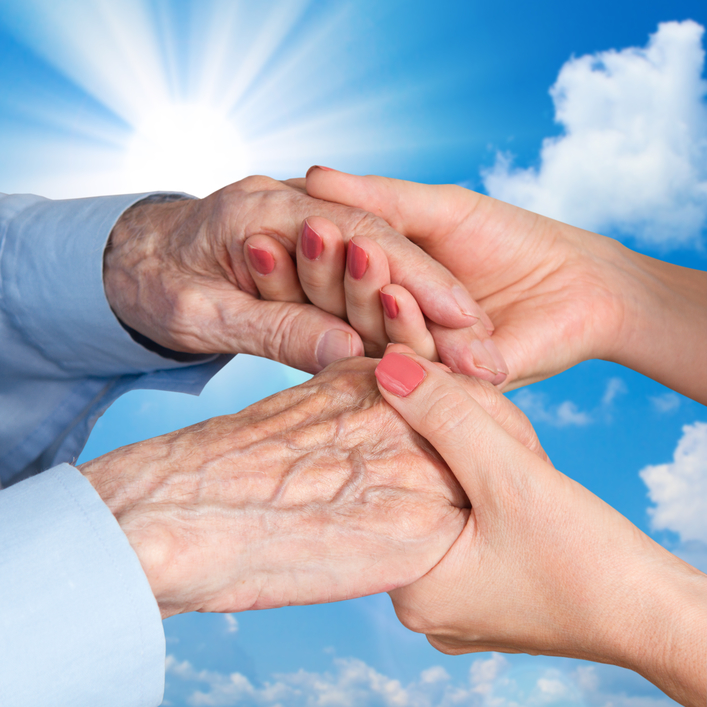Caregiver Stress and Burnout
Caregiver stress typically affects individuals who find themselves in the role of caring for a family member, whether they are adult children or spouses. Chronic stress is the result of prolonged exposure to challenging circumstances and conditions,

The burden of caregiving can take a significant toll on one's physical and emotional well-being, often leading to chronic stress. As a registered nurse with extensive experience, I have witnessed the profound impact of caregiver stress firsthand. In this discussion, we'll delve into the effects of caregiver stress on both mental and physical health and explore effective stress management strategies.
The Nature of Caregiver Stress:
Caregiver stress typically affects individuals who find themselves in the role of caring for a family member, whether they are adult children or spouses. Many caregivers share a common worry: "What if I fall ill and can no longer provide care for my loved one?" This concern, coupled with the demands of caregiving, often leads to chronic stress, which can have detrimental effects on one's health.
Understanding Chronic Stress:
Chronic stress is the result of prolonged exposure to challenging circumstances and conditions, often beyond one's control, leading to a continuous state of hyper-vigilance. Caregivers frequently navigate unpredictable and volatile situations, accompanied by irrational behavior. Sadly, they often lack reliable and consistent resources to address these challenges.
Caregiver Stress is Chronic Stress
Caregiver Burnout: Recognizing and Coping with the Stress of Caregiving
Caring for a loved one can be rewarding, but it's not without its challenges. The stress of long-term caregiving can accumulate over time, leading to emotional, mental, and physical exhaustion - also known as burnout. When you reach this point, both you and the person you're caring for suffer.
Taking care of yourself is not a luxury - it's a necessity. Your own well-being is just as important as the well-being of your family member. It's crucial to recognize the signs of caregiver stress and burnout so you can take action to improve the situation for both of you.
Common signs of caregiver stress
Common signs of caregiver stress include anxiety, depression, fatigue, difficulty sleeping, and neglecting personal responsibilities and leisure activities. On the other hand, signs of caregiver burnout may include constant exhaustion, neglecting your own needs, feeling helpless and hopeless, and being irritable with the person you're caring for.
To cope with the stress of caregiving and prevent burnout, here are some tips:
Feel empowered: Remember that you have the power to change your mindset and find happiness and hope, even in difficult circumstances. Avoid dwelling on things you can't control or searching for someone to blame.
Embrace your choice: Acknowledge that caregiving is a conscious choice you've made for meaningful reasons. Focus on the positive aspects and motivations behind your decision.
Look for the silver lining: Consider the ways caregiving has made you stronger and brought you closer to your loved one and other family members.
Maintain balance: Don't let caregiving consume your entire life. Invest in other areas that bring you meaning and purpose, whether it's your family, hobbies, or career.
Focus on what you can control: Instead of stressing over things outside of your control, focus on how you choose to react to problems.
Celebrate small victories: Remember that every effort you make matters. You don't have to cure your loved one's illness to make a difference. The simple acts of making them feel safe, comfortable, and loved are significant.
Seek appreciation: Feeling appreciated can greatly improve your overall well-being and enjoyment of life. Seek validation and support from others who understand your role as a caregiver.
Don't let caregiver burnout take a toll on your health and happiness. By recognizing the signs of burnout and implementing coping strategies, you can find more balance and fulfillment in your role as a caregiver.

Long-Term Impact on Health:
The repercussions of chronic caregiver stress extend beyond mental health, affecting physical well-being as well. Research conducted over the past two decades has demonstrated that individuals experiencing chronic stress face a significantly higher risk of heart attacks, strokes, and even cancer compared to their peers. Shockingly, statistics suggest that up to 50% of caregivers pass away before the individuals they care for, rising to 63% for caregivers of family members with dementia. Chronic stress appears to weaken the body and compromise the immune system, contributing to this alarming mortality rate.

The Physiological Response to Stress:
Stress is not merely an emotional state; it triggers a physiological reaction within the body, known as the hypothalamic-pituitary-adrenal (HPA) axis response. This intricate system regulates various vital functions, including blood pressure, heart rate, body temperature, blood circulation, and adrenaline release. During stressful events, the HPA system prepares the body to either confront the threat head-on (fight) or flee from it (flight).
The Role of the HPA System:
The HPA system, inherent in every individual, orchestrates this stress response. When stress becomes overwhelming, it quickly redirects blood circulation from extremities to internal organs and releases adrenaline for instant energy. The adrenal gland also produces steroid hormones, primarily cortisol, the primary stress hormone. Cortisol affects multiple bodily functions, including the heart, lungs, circulation, metabolism, immune system, and skin.
Chronic Stress and Its Consequences:
The HPA system's well-intentioned response to stress, while potentially life-saving in dire situations, becomes problematic when stress becomes routine. Chronic caregiver stress continuously triggers the release of stress hormones and neurotransmitters, leading to lasting harm to the body. Medical science identifies various adverse consequences of chronic stress, such as a weakened immune system, heightened susceptibility to infection and disease, digestive tract issues like ulcers, respiratory problems like asthma, and increased risk of heart disease, ultimately resulting in strokes and heart attacks.
Empowering Caregivers:
It is vital to recognize that caregivers are not exempt from the HPA system's physiological response to stress. The ongoing, chronic nature of caregiver stress makes it particularly debilitating to the body. Nevertheless, there are strategies to combat its effects effectively.
Discover the Power of Appreciation: Enhancing Your Caregiving Experience
Did you know that feeling appreciated can greatly impact your overall well-being? Despite the challenges of caregiving, studies have shown that caregivers who feel appreciated actually experience greater physical and emotional health. So what do you do if the person you're caring for can no longer show or feel their appreciation for your efforts?
Imagine how your loved one would respond if they were healthy. Picture them free from illness or pain, fully capable of expressing gratitude for your love and care. Remind yourself that their inability to show appreciation is not a reflection of the love they have for you.
Don't wait for validation from others. Take the time to recognize and reward your own efforts. Remind yourself of the difference you are making through caregiving. Write a list of all the ways your caregiving is making a positive impact and refer to it whenever you feel down.
Seek support beyond the person you're caring for. Positive reinforcement doesn't have to come solely from them. Turn to friends and family who will listen and acknowledge your efforts. Share your feelings and concerns with them.

Avoid caregiver burnout by asking for help.
Avoid caregiver burnout by asking for help. Don't try to shoulder all the responsibilities alone. Seek respite care options or ask friends and family to assist with errands and meals. Consider enlisting volunteers or paid help to provide occasional or regular in-home services. Explore out-of-home respite programs like adult day care centers and nursing homes.
Communicate your needs and emotions. Don't assume that others know what you're going through. Be upfront about your situation and express your concerns or ideas for improvement. Start a dialogue with others involved in caregiving.
Divide the responsibilities. Build a care team partner support group. The How to Become a Patient Care Advocate course and manual teaches you how to build a support team. Involve as many family members as possible, even those who live far away. Delegate tasks to different individuals, such as medical responsibilities, finances, and errands.
Establish regular check-ins. Ask someone from your support network to call you at a set time to provide updates and coordinate with other family members.
Accept offers of assistance. Don't hesitate to let others help you. Have a list of small tasks ready that others can easily handle, like grocery shopping or driving your loved one to appointments.
Learn to delegate and let go of control. Avoid micromanaging and insisting on doing everything your way. People will be more willing to help if they feel trusted and respected.
Give yourself a break. Carve out leisure time for yourself, even if it feels impossible. Resting and indulging in activities you enjoy will make you a better caregiver in the long run.
Differentiate between busyness and productivity. Taking regular breaks and practicing self-care will increase your energy and focus, leading to greater productivity in the end.
Nurture your personal relationships. Don't neglect your friendships amidst caregiving. Invite friends over for coffee, tea, or dinner if leaving the house is challenging.
Share your feelings. Expressing what you're going through can be cathartic. Trust in your family and friends to support you and strengthen your bond.
Prioritize enjoyable activities. Make time for hobbies that bring you happiness, whether it's reading, gardening, or playing with pets.
Treat yourself. Small luxuries can alleviate stress and boost your spirits. Take a relaxing bath, ask for a back rub, pamper yourself with a manicure, or bring fresh flowers into your home.
Embrace laughter. Find humor in everyday situations to lighten the mood and bring joy into your caregiving experience.

Practice Stress Management:
Stress management is key to mitigating the impact of caregiver stress. This website aims to provide valuable resources, programs, and products to equip caregivers with the knowledge to make informed choices that reduce the workload, save money, and enhance care quality for their loved ones.
Effective Relaxation Techniques:
To alleviate caregiver stress, consider proven relaxation techniques, such as guided imagery, meditation, prayer, utilizing adult day care services, seeking help from friends and relatives, listening to music, enjoying leisure activities like going to the movies, finding humor, engaging in massage therapy, going for walks, and participating in regular exercise. These strategies can help manage stress levels and foster a sense of well-being.
Prioritizing Self-Care:
Caregivers must recognize the importance of self-care. Neglecting one's own well-being ultimately hinders the ability to provide effective care for a loved one. The staggering mortality rate among caregivers emphasizes the urgency of self-care. By focusing on themselves, caregivers ensure they will be there for their loved ones in the long run.
Conclusion:
Caregiver stress is a serious concern that can have devastating consequences on both mental and physical health. However, through stress management techniques and prioritizing self-care, caregivers can mitigate the effects of chronic stress. This website,caregiverrelief.com provides valuable tools and resources to support caregivers in their journey, ultimately helping them maintain their well-being while providing the best care for their loved ones.
Read how our caregiver support group lost several caregivers to chronic stress
Our Resources section can help you find the information and tools that you need. We have courses, videos, checklists, guidebooks, cheat sheets, how-to guides and more.
You can get started by clicking on the link below. We know that taking care of a loved one is hard work, but with our help you can get the support that you need.
Click here to go to Resources Section now!
You might also like this article:







